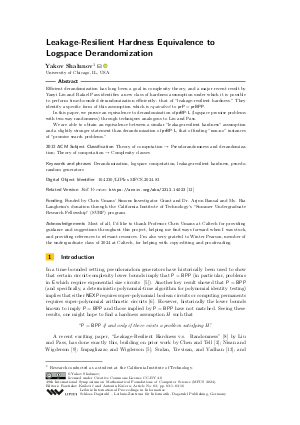Leakage-Resilient Hardness Equivalence to Logspace Derandomization
Author
Yakov Shalunov 
-
Part of:
Volume:
49th International Symposium on Mathematical Foundations of Computer Science (MFCS 2024)
Part of: Series: Leibniz International Proceedings in Informatics (LIPIcs)
Part of: Conference: Mathematical Foundations of Computer Science (MFCS) - License:
 Creative Commons Attribution 4.0 International license
Creative Commons Attribution 4.0 International license
- Publication Date: 2024-08-23
File

PDF
LIPIcs.MFCS.2024.83.pdf
- Filesize: 0.73 MB
- 16 pages
Document Identifiers
Related Versions
- Full Version https://arxiv.org/abs/2312.14023
Subject Classification
ACM Subject Classification
- Theory of computation → Pseudorandomness and derandomization
- Theory of computation → Complexity classes
Keywords
- Derandomization
- logspace computation
- leakage-resilient hardness
- psuedorandom generators
Metrics
- Access Statistics
-
Total Accesses (updated on a weekly basis)
0PDF Downloads0Metadata Views
Abstract
Efficient derandomization has long been a goal in complexity theory, and a major recent result by Yanyi Liu and Rafael Pass identifies a new class of hardness assumption under which it is possible to perform time-bounded derandomization efficiently: that of "leakage-resilient hardness." They identify a specific form of this assumption which is equivalent to prP = prBPP. In this paper, we pursue an equivalence to derandomization of prBP⋅L (logspace promise problems with two-way randomness) through techniques analogous to Liu and Pass. We are able to obtain an equivalence between a similar "leakage-resilient hardness" assumption and a slightly stronger statement than derandomization of prBP⋅L, that of finding "non-no" instances of "promise search problems."
Cite As Get BibTex
Yakov Shalunov. Leakage-Resilient Hardness Equivalence to Logspace Derandomization. In 49th International Symposium on Mathematical Foundations of Computer Science (MFCS 2024). Leibniz International Proceedings in Informatics (LIPIcs), Volume 306, pp. 83:1-83:16, Schloss Dagstuhl – Leibniz-Zentrum für Informatik (2024)
https://doi.org/10.4230/LIPIcs.MFCS.2024.83
BibTex
@InProceedings{shalunov:LIPIcs.MFCS.2024.83,
author = {Shalunov, Yakov},
title = {{Leakage-Resilient Hardness Equivalence to Logspace Derandomization}},
booktitle = {49th International Symposium on Mathematical Foundations of Computer Science (MFCS 2024)},
pages = {83:1--83:16},
series = {Leibniz International Proceedings in Informatics (LIPIcs)},
ISBN = {978-3-95977-335-5},
ISSN = {1868-8969},
year = {2024},
volume = {306},
editor = {Kr\'{a}lovi\v{c}, Rastislav and Ku\v{c}era, Anton{\'\i}n},
publisher = {Schloss Dagstuhl -- Leibniz-Zentrum f{\"u}r Informatik},
address = {Dagstuhl, Germany},
URL = {https://drops.dagstuhl.de/entities/document/10.4230/LIPIcs.MFCS.2024.83},
URN = {urn:nbn:de:0030-drops-206395},
doi = {10.4230/LIPIcs.MFCS.2024.83},
annote = {Keywords: Derandomization, logspace computation, leakage-resilient hardness, psuedorandom generators}
}
Author Details
Funding
Funded by Chris Umans' Simons Investigator Grant and Dr. Arjun Bansal and Ms. Ria Langheim’s donation through the California Institute of Technology’s "Summer Undergraduate Research Fellowship" (SURF) program.
Acknowledgements
Most of all, I'd like to thank Professor Chris Umans at Caltech for providing guidance and suggestions throughout this project, helping me find ways forward when I was stuck, and providing references to relevant resources. I'm also very grateful to Winter Pearson, member of the undergraduate class of 2024 at Caltech, for helping with copy-editing and proofreading.
References
-
Sanjeev Arora and Boaz Barak. Computational Complexity: a Modern Approach. Cambridge University Press, 2009.

- Lijie Chen and Roei Tell. Hardness vs randomness, revised: Uniform, non-black-box, and instance-wise. In 2021 IEEE 62nd Annual Symposium on Foundations of Computer Science (FOCS), pages 125-136, 2022. URL: https://doi.org/10.1109/FOCS52979.2021.00021.
- Dean Doron and Roei Tell. Derandomization with minimal memory footprint. In Proceedings of the Conference on Proceedings of the 38th Computational Complexity Conference, CCC '23, Dagstuhl, DEU, 2023. Schloss Dagstuhl - Leibniz-Zentrum für Informatik. URL: https://doi.org/10.4230/LIPIcs.CCC.2023.11.
- Oded Goldreich. In a World of P=BPP, pages 191-232. Springer Berlin Heidelberg, Berlin, Heidelberg, 2011. URL: https://doi.org/10.1007/978-3-642-22670-0_20.
- Russell Impagliazzo and Avi Wigderson. P = bpp if e requires exponential circuits: derandomizing the xor lemma. In Proceedings of the Twenty-Ninth Annual ACM Symposium on Theory of Computing, STOC '97, pages 220-229, New York, NY, USA, 1997. Association for Computing Machinery. URL: https://doi.org/10.1145/258533.258590.
- Valentine Kabanets and Russell Impagliazzo. Derandomizing polynomial identity tests means proving circuit lower bounds. Computational Complexity, 13:1-46, 2004. URL: https://doi.org/10.1007/s00037-004-0182-6.
- Adam R. Klivans and Dieter van Melkebeek. Graph nonisomorphism has subexponential size proofs unless the polynomial-time hierarchy collapses. SIAM Journal on Computing, 31(5):1501-1526, 2002. URL: https://doi.org/10.1137/S0097539700389652.
- Yanyi Liu and Rafael Pass. Leakage-resilient hardness vs randomness. In Proceedings of the Conference on Proceedings of the 38th Computational Complexity Conference, CCC '23, Dagstuhl, DEU, 2023. Schloss Dagstuhl - Leibniz-Zentrum für Informatik. URL: https://doi.org/10.4230/LIPIcs.CCC.2023.32.
- Noam Nisan and Avi Wigderson. Hardness vs randomness. Journal of Computer and System Sciences, 49(2):149-167, 1994. URL: https://doi.org/10.1016/S0022-0000(05)80043-1.
- Rafael Pass and Oren Renard. Characterizing the power of (persistent) randomness in log-space. Electronic Consortium on Computational Complexity, 2023. URL: https://eccc.weizmann.ac.il/report/2023/211/.
- Ronald L. Rivest and Adi Shamir. Efficient factoring based on partial information. In Franz Pichler, editor, Advances in Cryptology - EUROCRYPT '85, Workshop on the Theory and Applications of Cryptographic Techniques, volume 219 of Lecture Notes in Computer Science, pages 31-34. Springer, April 1985. URL: https://doi.org/10.1007/3-540-39805-8_3.
- Yakov Shalunov. Leakage-resilient hardness equivalence to logspace derandomization. arXiv. URL: https://arxiv.org/abs/2312.14023.
- Madhu Sudan, Luca Trevisan, and Salil Vadhan. Pseudorandom generators without the xor lemma. Journal of Computer and System Sciences, 62(2):236-266, 2001. URL: https://doi.org/10.1006/jcss.2000.1730.
- Salil P. Vadhan. Pseudorandomness. Foundations and Trends® in Theoretical Computer Science, 7(1–3):1-336, 2012. URL: https://doi.org/10.1561/0400000010.
- Andrew C. Yao. Theory and application of trapdoor functions. In 23rd Annual Symposium on Foundations of Computer Science (sfcs 1982), pages 80-91, 1982. URL: https://doi.org/10.1109/SFCS.1982.45.
